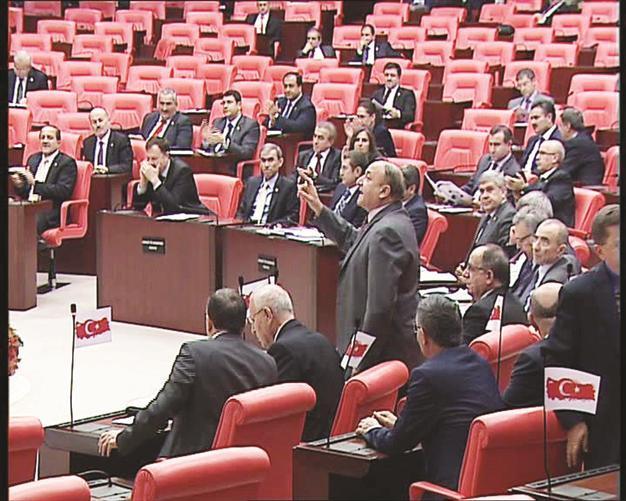Parliament set for historic week
ANKARA - Hürriyet Daily News

Last month, MHP deputies have protested the peace process with flags on their tables. Parliament will likely host heated sessions this week. DHA photo
Parliament is again getting ready for a historic session this week, with the Justice and Development Party (AKP) government having decided to take the peace process to the parliamentary platform. The fact that jailed Abdullah Öcalan and “Kandil” demanded “parliamentary assurance” for the withdrawal of Kurdistan Workers’ Party (PKK) members was influential in this decision. The government wants to complete the procedural stages and provide for a swift withdrawal of the PKK beyond the Turkish borders. No doubt, the parliamentary stage of this process will be painful. The opposition parties, especially the Nationalist Movement Party’s (MHP) angry resistance, will cause heated debate at the General Assembly. Besides this, surprise developments are also expected…
Finally, the government is set to take a number of simultaneous steps at Parliament this week. The Constitution Conciliation Commission will meet today and decide whether or not to continue with its work. There is no realistic possibility of the four parties reconciling in the end. If the Constitution team is eventually dispersed, then contacts will be initiated for the AKP and Peace and Democracy Party’s (BDP) joint Constitution initiative.
The government is thus preparing for what may turn out to be the toughest week of this legislative term. Tomorrow, the AKP is opening the peace process for debate at Parliament. Deputy Prime Minister Bekir Atalay, who is in charge of the initiative, will inform the General Assembly of the process.
Parliamentary groups will be given the floor and, according to Parliament’s internal regulations, a general debate will take place. Next will come the debate on the proposal submitted by the ruling party last week about the formation of a “Commission on Monitoring and Assessing the Process.” This will also become a second debate session, in which all groups will be able to express their opinions. It is certain that the MHP group will resist will all its might at the General Assembly; but what will the main opposition Republican People’s Party (CHP) do?
Unless there is a counter move from Prime Minister Recep Tayyip Erdoğan, the CHP will probably take its place next to the MHP in resisting the commission. So, can the CHP’s stance change?
It is useful to remember that within the CHP there are names who support the process, and those who are against it. Deputy Chairman Sezgin Tanrıkulu is one of the supporters. Several names who are in the “reformist wing” say the party should take its place in the solution process and oppose mistakes made by the government within it. However, the CHP’s nationalist wing is against the process and has a tough, unbending stance.
The move that may break the resistance in the CHP may come from Erdoğan. The surprise is expected right at this point. It is being said that in the event that Erdoğan returns the visit of CHP leader Kemal Kılıçdaroğlu, there may be a formula created for the research commission. If Erdoğan gets together with Kılıçdaroğlu and breaks the ice, then the research proposals of the AKP, CHP and BDP - which all have different names but which all may contain similar content - may be combined at the General Assembly.
Another surprise that may emerge is a possible legal amendment. The 4th Judicial Package is also expected to be debated at the General Assembly this week. Even though it is a low possibility, there are whispers in the corridors that a proposal could be expected about the kind of “legal assurance” that Öcalan had mentioned earlier, or a judicial package that may facilitate the “withdrawal across the borders” or “home-coming.” Such a move should not be considered a surprise when it’s recalled that government spokesmen, after less than a week had passed since they insisted that the process would not be carried to Parliament, then submitted a research proposal for exactly that.
How many Kurds vote for the AKP?
In the meeting held with deputies from the Marmara region, Prime Minister Recep Tayyip Erdoğan revealed the results of a survey conducted in March.
Erdoğan said the AKP’s overall vote rate across the country was 52.9 percent, while that of main opposition Republican People’s Party (CHP) was 22 percent.
In addition, those who voted for the AKP were classified according to their ethnic background. The number of these voters who defined themselves as “Turk” was 50 percent, while the number who defined themselves as “Kurd” was 48 percent.
Preparation for headscarf ruling
The Parliamentary Conciliation Commission for Internal Regulations is working hard, and is set to tackle the article regulating the outfits of female deputies in the coming days.
The tendency in the AKP wing is to make an arrangement in which female deputies will be allowed to wear both the headscarf and trousers at the General Assembly, and AKP commission member Haluk İpek is making preparations for this proposal.
In the 1999 elections, Merve Kavakçı who wears a headscarf was elected as a deputy from the Virtue Party (FP), but was unable to take the oath. The ruling AKP wants to elect a deputy to Parliament wearing the headscarf at the next general elections, and the foundations for this are being laid with the new internal regulations code.
